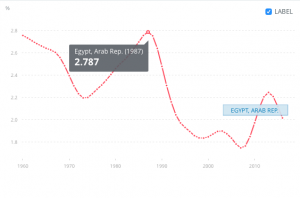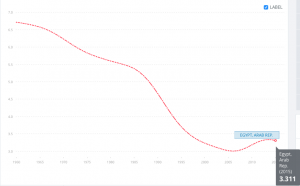The rapid growth of Egypt’s population will become the main challenge facing the country, Prime Minister Sherif Ismail said during a speech on the inauguration day of parliament’s third session on Monday.
“In all honesty, the biggest challenge that we should be combating is population growth; especially after we reached an unprecedented increase that would affect what has been accomplished in terms of economic growth,” the Prime Minister said, as quoted by Ahram Online.
He stressed that population growth has been a longstanding problem hindering the country’s progress for decades, pointing out that President Abdel Fattah al-Sisi has decreed that a comprehensive strategy combatting the issue be implemented.
“The president ordered earlier that a comprehensive strategy [to] be put in place to overcome this major challenge that has been crippling the country for decades. We have indeed pinpointed a strategy, but we need the support of all involved bodies,” he said during his address.
Ismail’s comments come just days after Egypt’s official statistics agency CAPMAS announced that the country’s population hit 104.2 million, including 94.98 million that reside within the country while 9.4 million live abroad.
The new figures have raised concerns regarding effective job creation, family planning programs, economic growth and wage level development.
In July, the President also pointed to the challenge of the accelerating growth of the population, highlighting how the issue is connected to the state’s provision of public services.
“You want to ensure education is provided to all? Fix the population problem. You want to guarantee job opportunities? Fix the population problem. You want medical services? Fix the population problem,” he said.
In January, he made a similar statement, saying that overpopulation is one of the major challenges confronting the state.
Egyptian officials have long been aware of the threat posed by the unsustainable rate by which the country’s populace is increasing. Although demographic growth rates have been rising at untenable levels for decades, 2013 was a record year, with the number of births reaching 2.6 million, while just 0.5 million deaths were recorded.
Although the population boom has slowed since then, the annual growth rate hit 2 percent in 2016, compared to 2.3 percent in 2013.
Since statistics began being recorded in 1960, Egypt witnessed its highest annual population increase in 1987, reaching 2.8 percent, according to the World Bank.

Also, despite fertility rates having aggressively gone down in the past decades, the number of births per Egyptian woman has grown since 2007. In 2015, the fertility rate reached 3.3 children per woman. Although it is not among the highest in the world, it is still significantly higher than the world average of 2.45.

The problem is severely compounded by the fact that Egyptian state institutions have struggled with delivering the most basic of public services, including quality education, healthcare and housing. As to the housing issue, a perplexing figure revealed with the publication of the new CAPMAS statistics reveals as many as 12.8 million housing units are vacant. At the same time, the country is experiencing a severe housing shortage, with people being compelled to build informal houses to meet their needs.
However, state officials often fail to take responsibility for the state’s incapacity – or unwillingness – to ensure that sufficient public services are provided to the people, instead of putting the blame on the untenable population growth.
Tarek Tawfiq, head of the National Population Council, claimed in January that one of the primary reasons causing poverty in the country is the rising population figures, al-Shorouq newspaper reported.
However, Egypt’s capacity to balance its spiraling population increase along with providing the necessary amount of public services and facilities has been hampered by the government directing scarce public resources elsewhere.
Nevertheless, analysts and observers have pointed to the threat of the population boom, many seeing it as a “social timebomb”.
While approximately 800.000 young Egyptians enter the job market every year, official unemployment hovers around 12 percent. However, many believe that figure is an underestimation as around 40 percent of the working population are considered to be employed in the informal sector.
In fact, the World Bank recorded that informal employment is not decreasing, but has rather jumped 10 percentage points since 1998. That means that more Egyptians are working without contracts and under poor conditions.
“Now you [already] have a very high level of unemployment, especially among university graduates and young people,” Hussein Sayed, professor of statistics at Cairo University, told the Guardian in 2014.
“Without any hopes and opportunities, those people become frustrated, and a serious source of unrest – and that was a major push-factor for the unrest in 2011,” he said.
Implementing family planning programs is seen as a crucial step that the government needs to take in order to come to grips with the population dilemma.
A recent example of the controversial nature of sex education and contraceptive awareness in Egypt is how a project by a group of Egyptian university students on sex education was lambasted as “scandalous” in the Egyptian local press.
“In the 1990s, the Hosni Mubarak regime pushed to reduce fertility rates by implementing public awareness campaigns to educate citizens about birth control and by opening Planned Parenthood clinics,” according to an article by The Fanack Chronicle of the Middle East & North Africa.
Contraception awareness programs decreased during former president Mohammed Morsi’s reign (2012-2013), as his Muslim Brotherhood saw population control as disrupting traditional family life.
However, the recent statements by Prime Minister Ismail and President Sisi indicate a willingness to at least recognize that the country indeed has a tangible problem in terms of a rapidly growing population.
At the same time, critics have underscored that simply taking control over Egypt’s accelerating population will not be enough to solve the country’s problems of poverty and service provision.
They see the main causes for the country’s high poverty levels and insufficient services delivered by the state as being the government’s IMF-sponsored economic reform programs, with their accompanying austerity measures.
A key demand by the IMF has been to cut down on public spending, including slashing energy subsidies and restricting wage levels.
Although population growth is recognized as a real problem, responsibility according to critics should not be put on the individual citizen, but rather on the state.








Comments (7)
[…] The comments by al-Saeed echo those made by Egypt’s Prime Minister in October. […]
[…] of parliament’s third session on Monday, the rapid growth of Egypt’s population will become the main challenge facing the […]